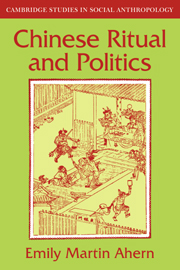5 - Open and closed practices
Published online by Cambridge University Press: 04 March 2010
Summary
Searle's distinction between constitutive and regulative rules has been used by Tom Morawetz as the basis of a distinction between ‘open’ and ‘closed’ practices (1973: 860–1). In this chapter we will see how Morawetz's distinction can be used to illuminate certain aspects of change in Chinese ritual; in the next chapter we will see how open and closed rituals relate differently to the Chinese state.
Examples of closed practices are games like chess and baseball. A closed practice is one in which each instantiation (each game, for example) has an explicit beginning and end. Participants qualify as participants when they are familiar with all the rules of the practice which define moves, positions, goals, etc., rules which can be given more or less exhaustively and are constitutive of the practice. During a game, these rules are fixed (Morawetz 1973: 860).
Examples of open practices are particular legal systems and particular languages. In open practices,
participation is ordinarily open-ended and the rules of the practice are standing rules which govern on-going activity. Participants are not required to know the particular rules which define permissible moves and positions in order for them to qualify as participants, and in fact they may not do so. Moreover, it may be impossible in principle to give an exhaustive and complete account of the rules of the practice, either because they are unlimited in number or, more importantly, because the set of rules is constantly evolving. The practice may provide institutional ways in which rules can be changed (pp. 860–1).
- Type
- Chapter
- Information
- Chinese Ritual and Politics , pp. 64 - 74Publisher: Cambridge University PressPrint publication year: 1981

